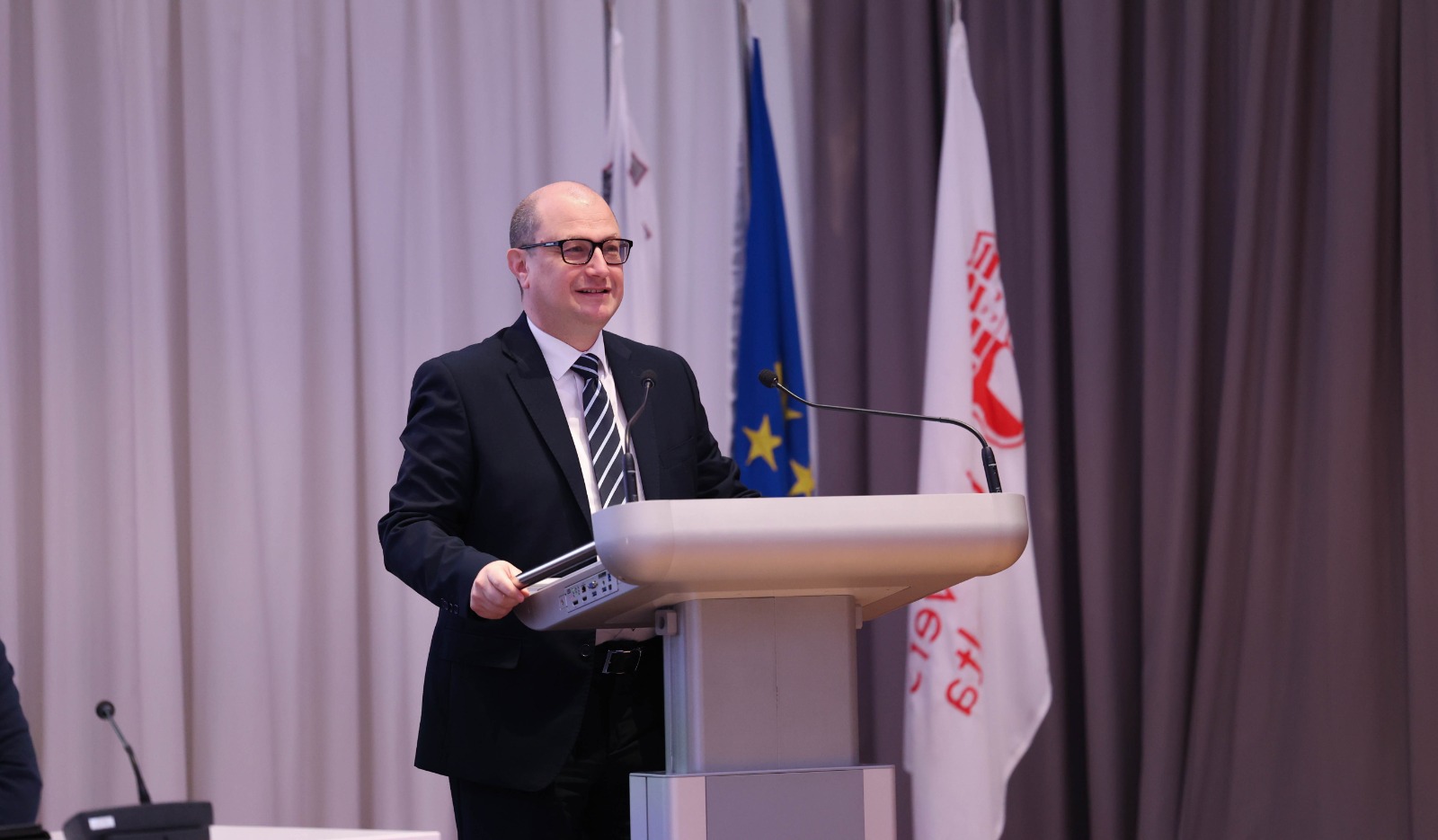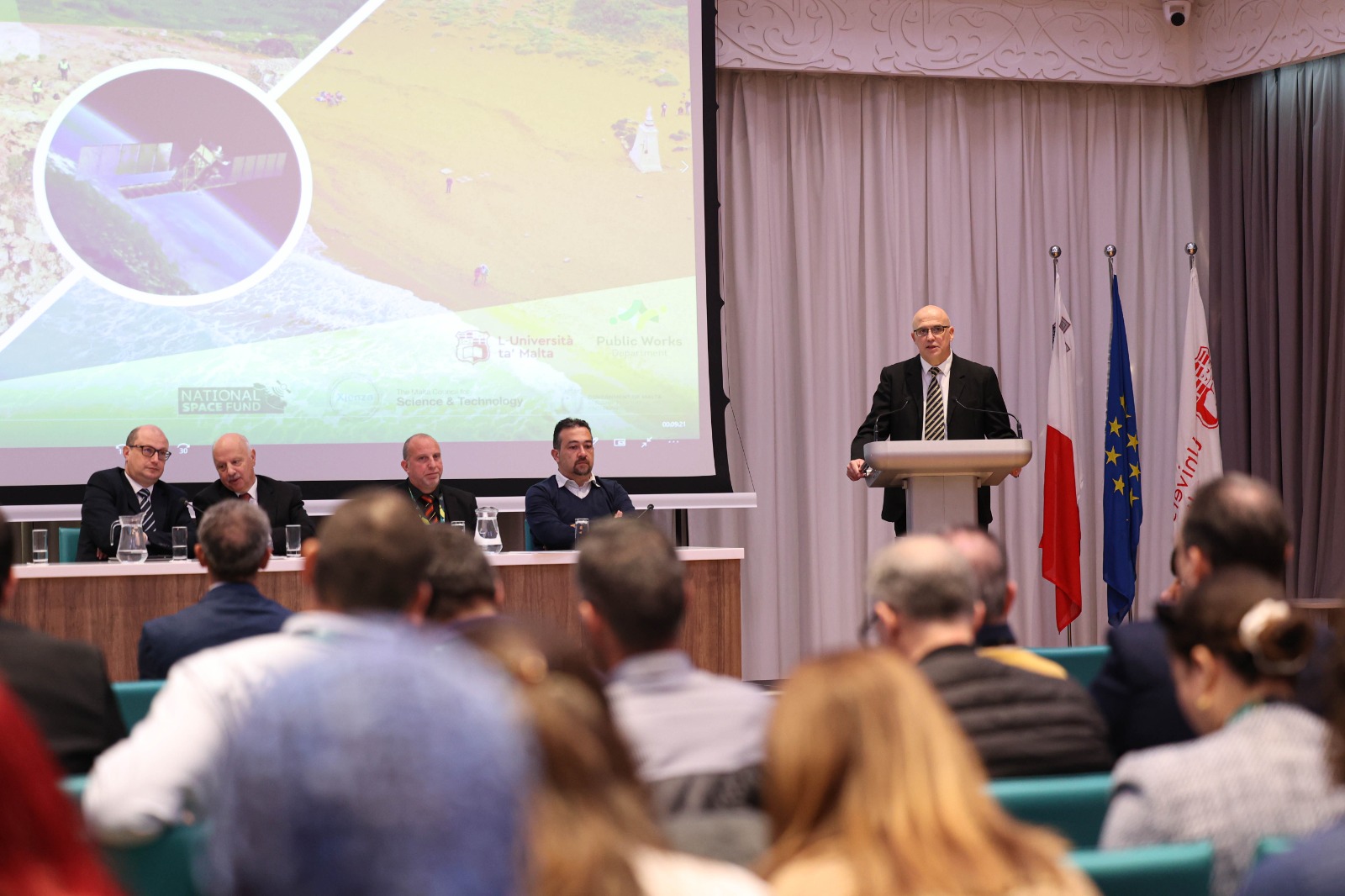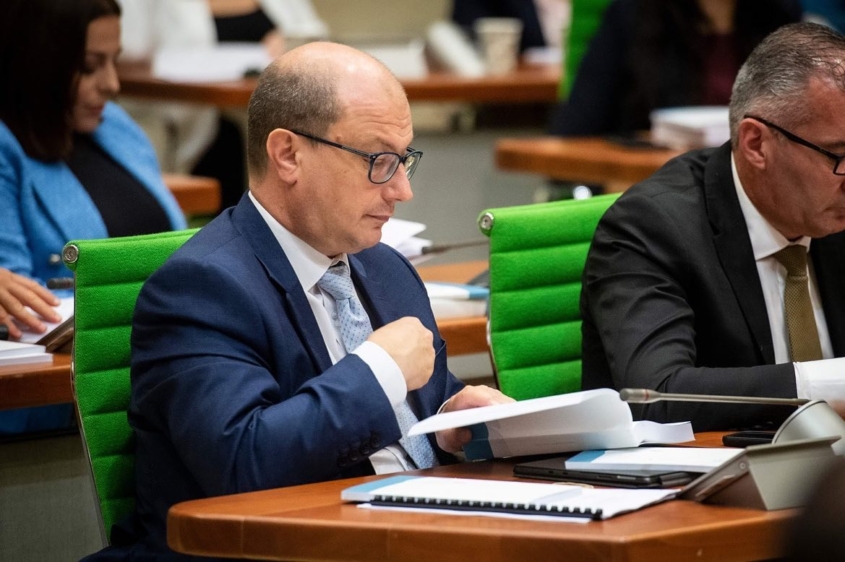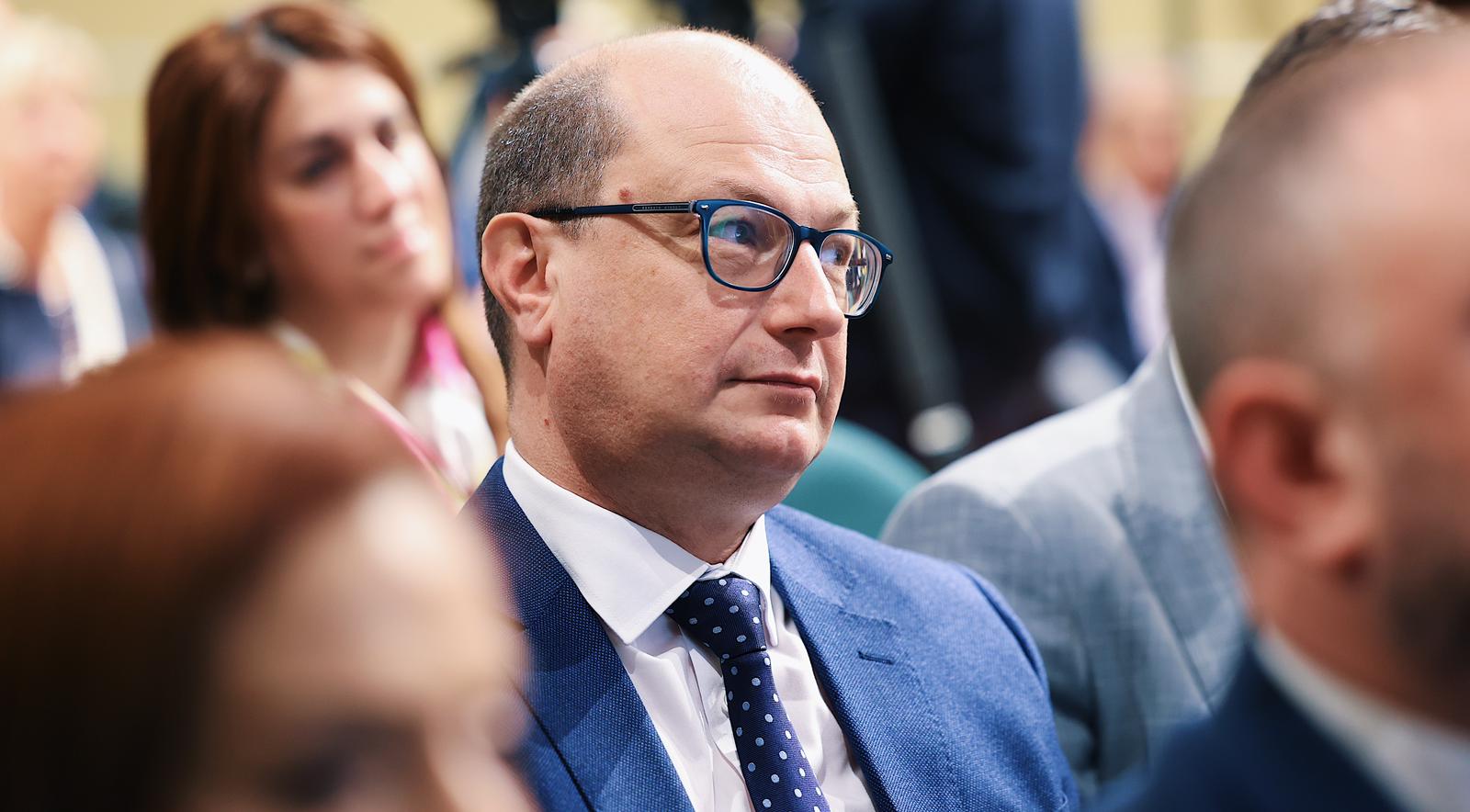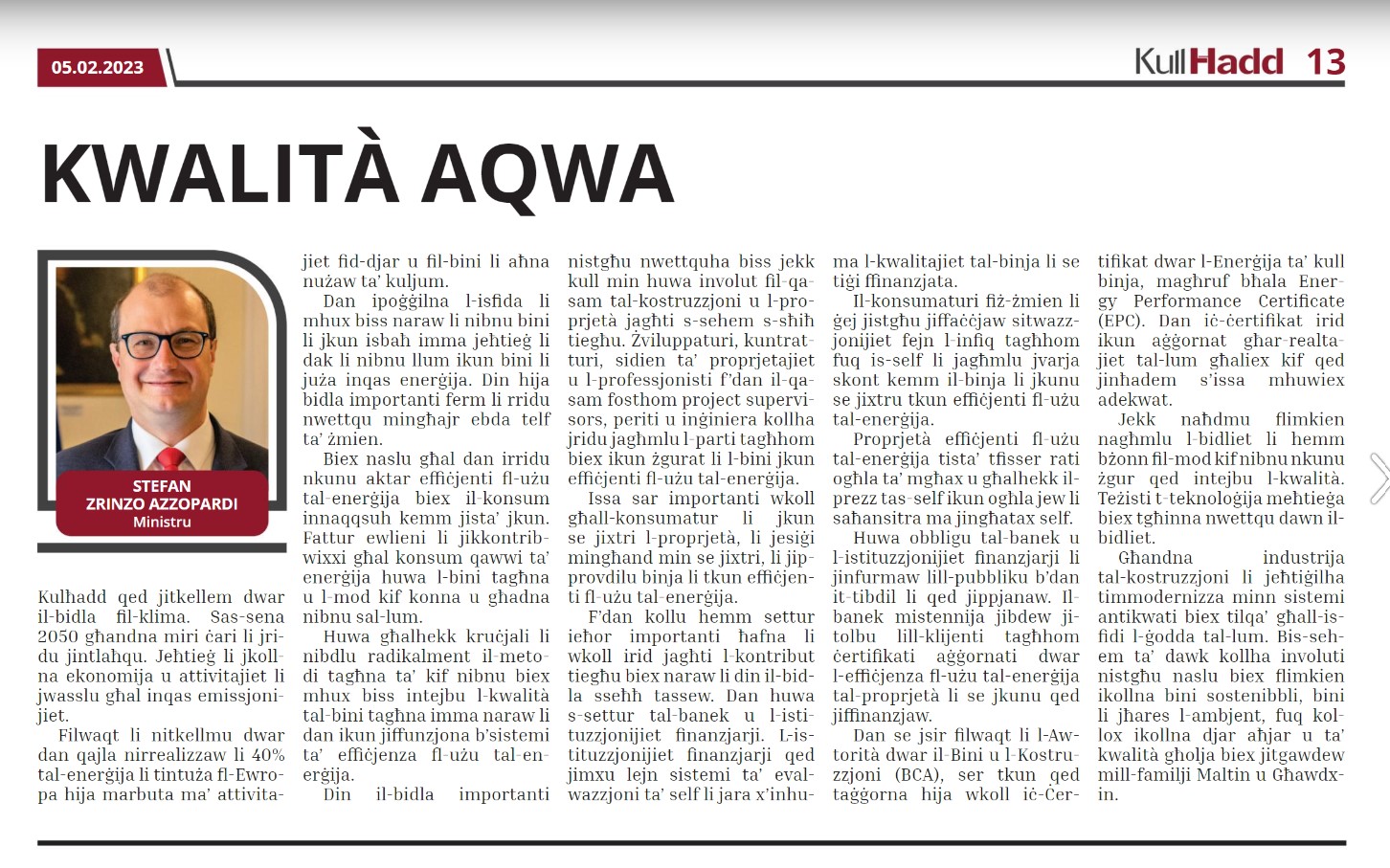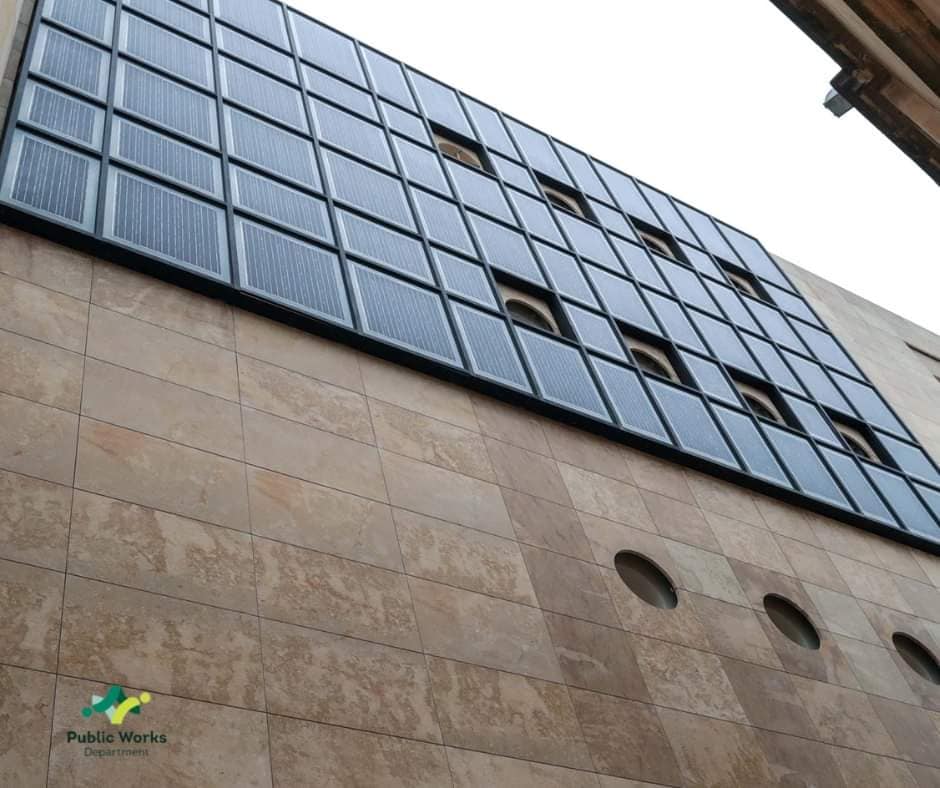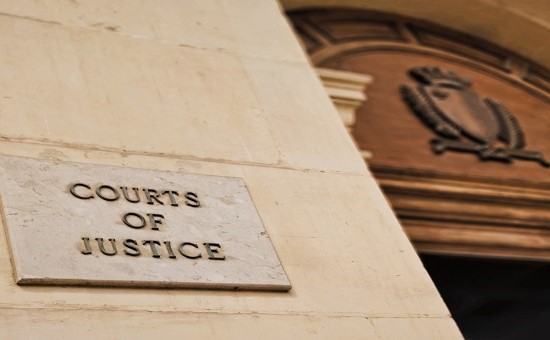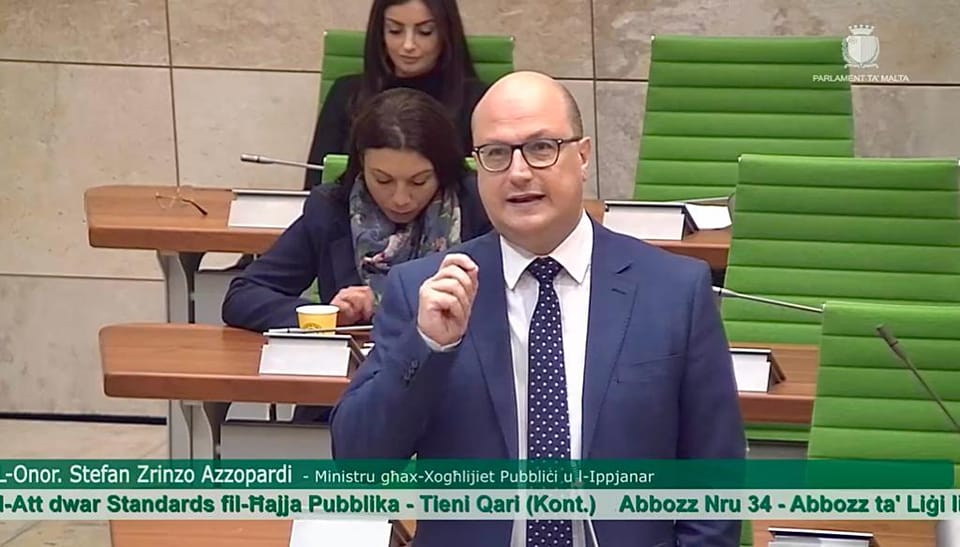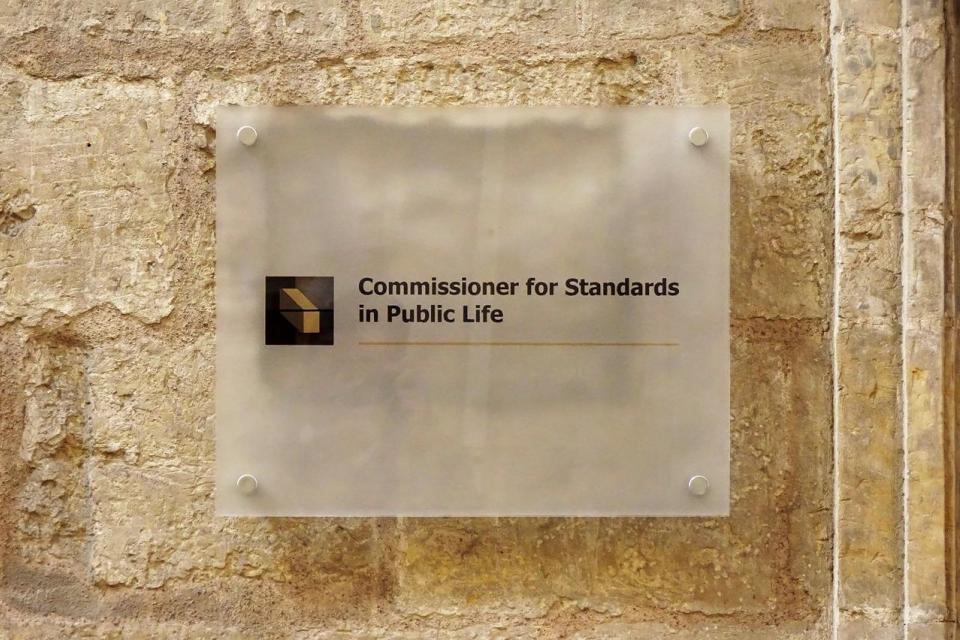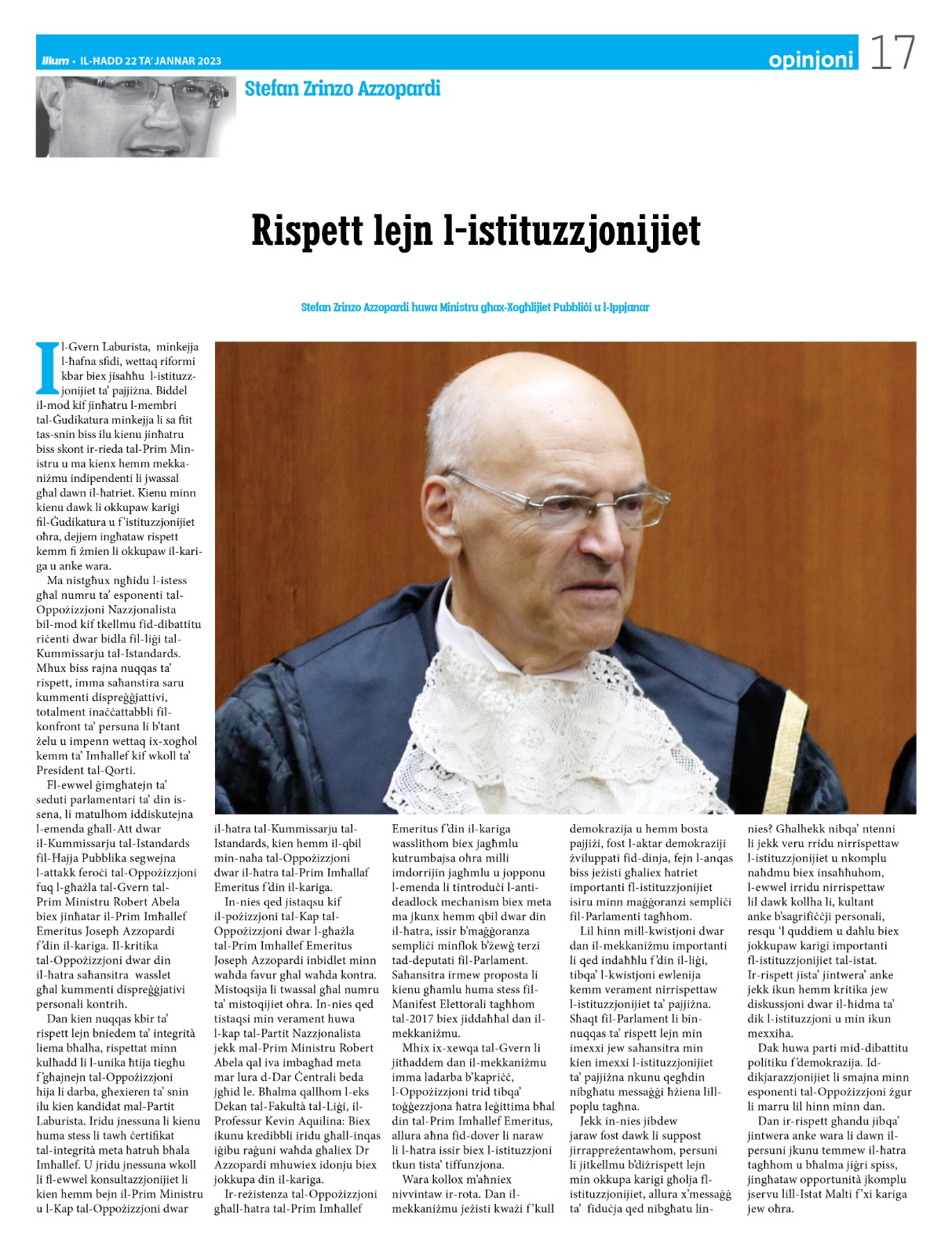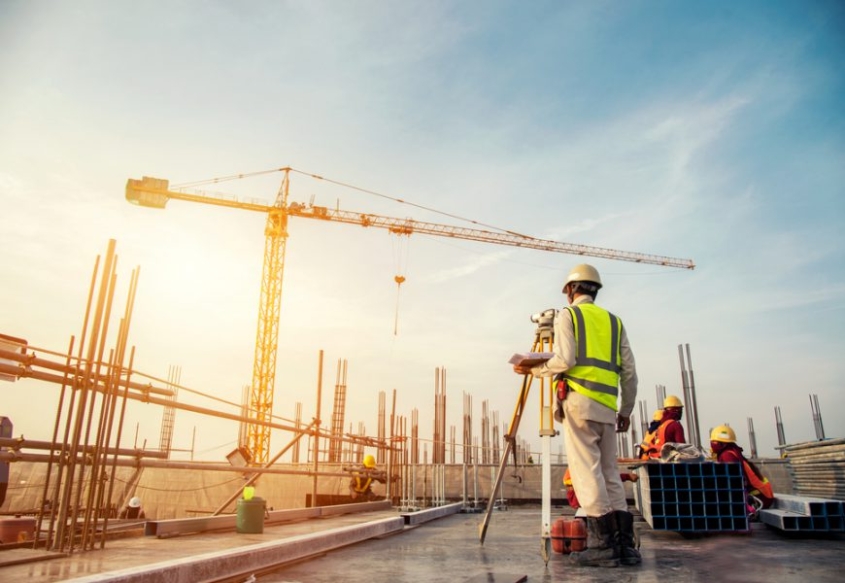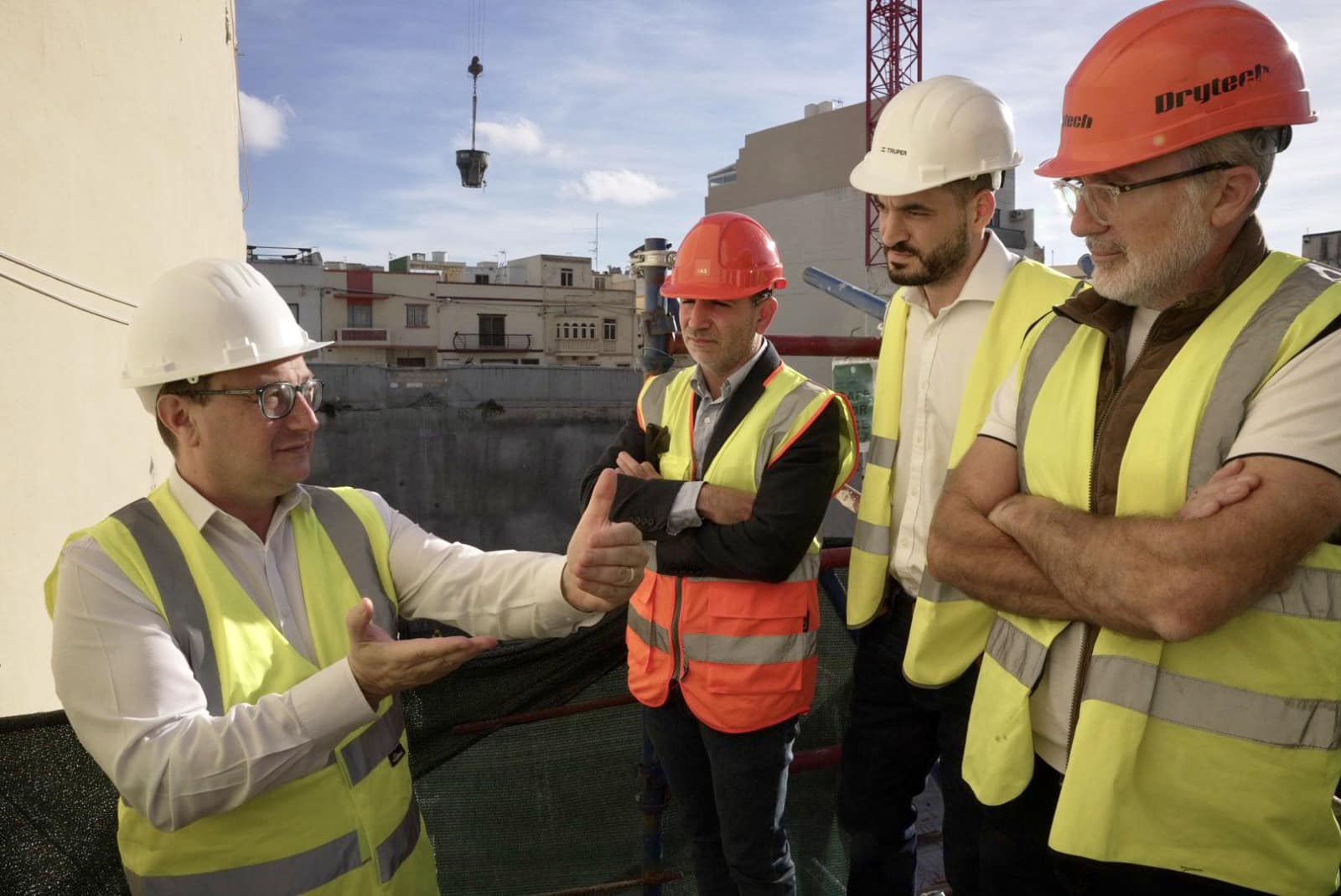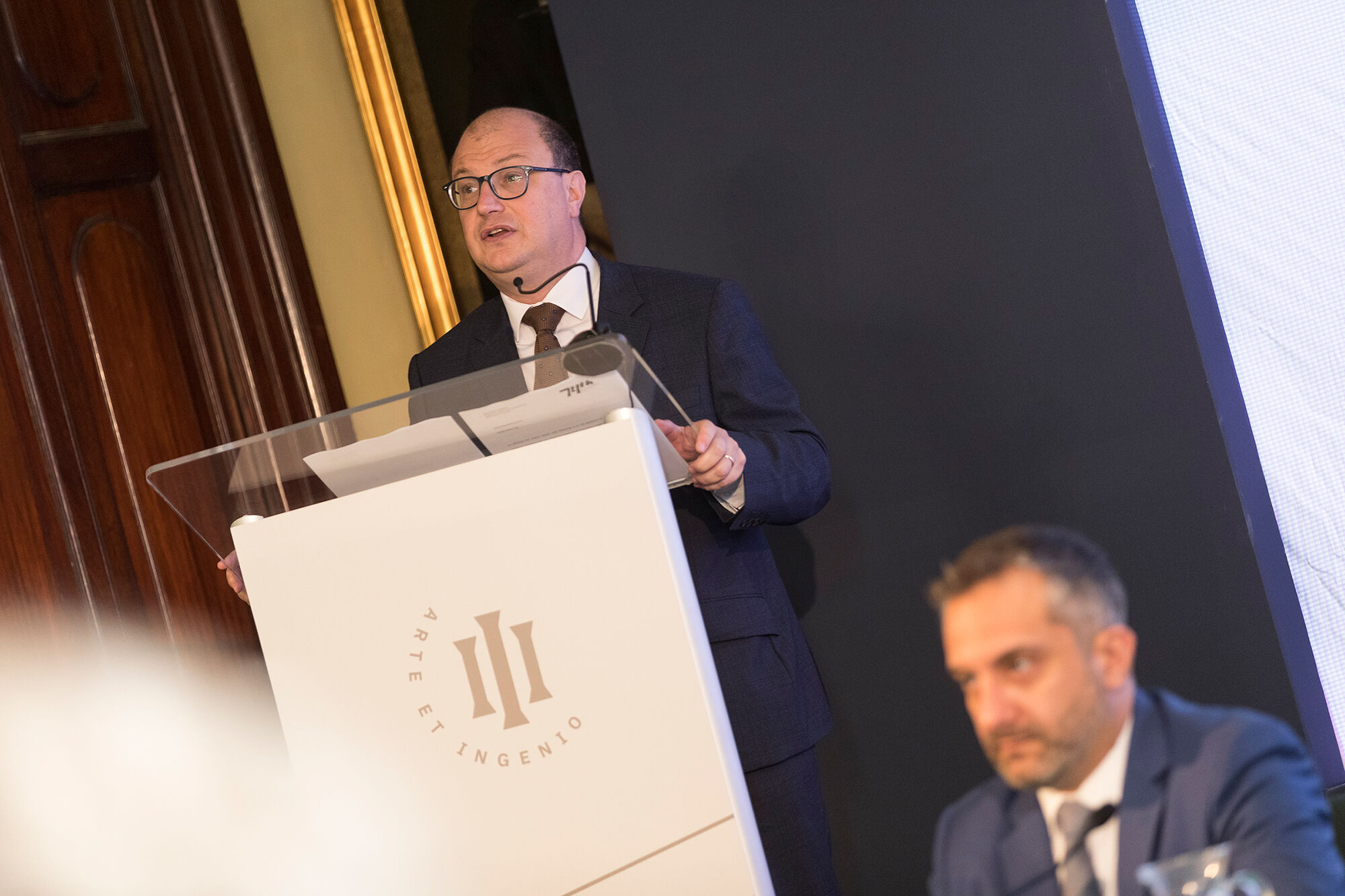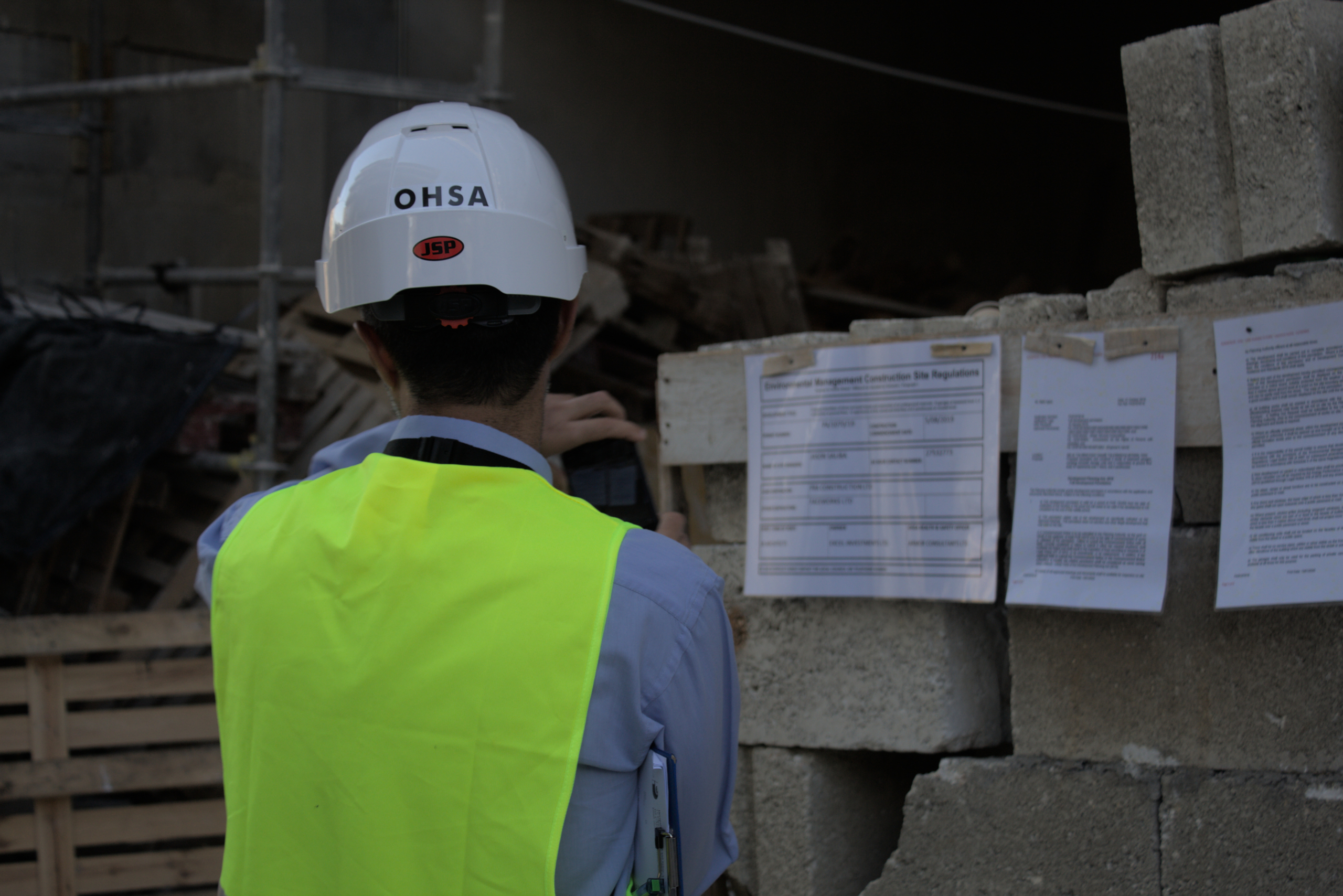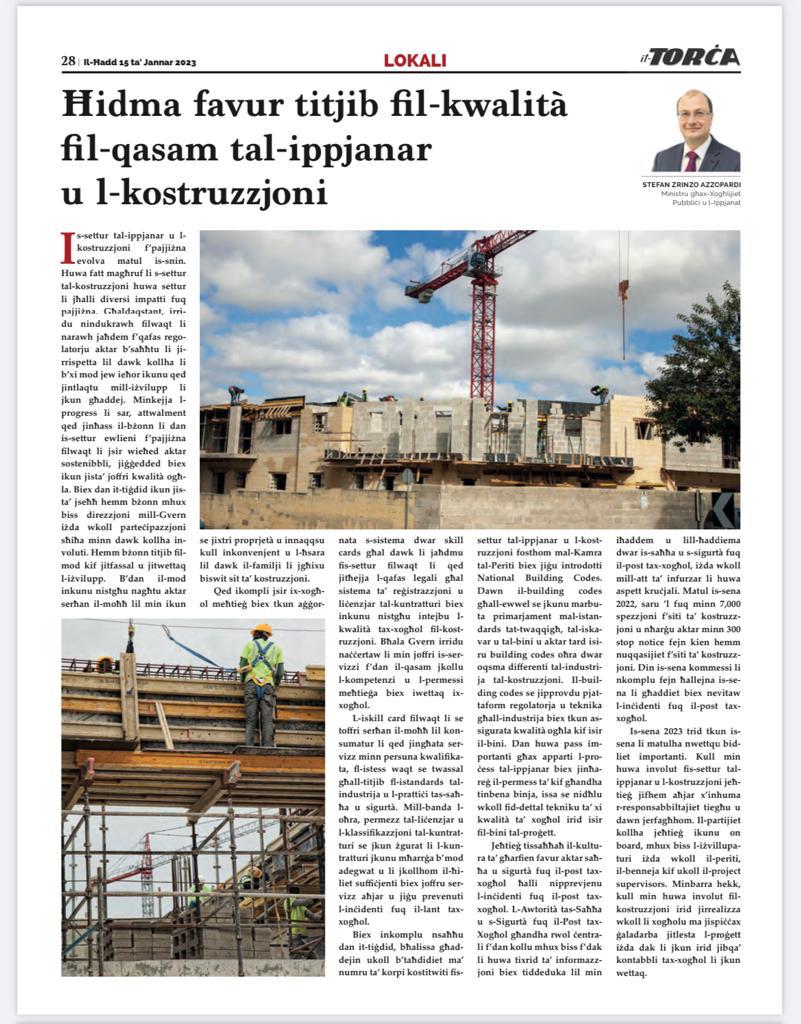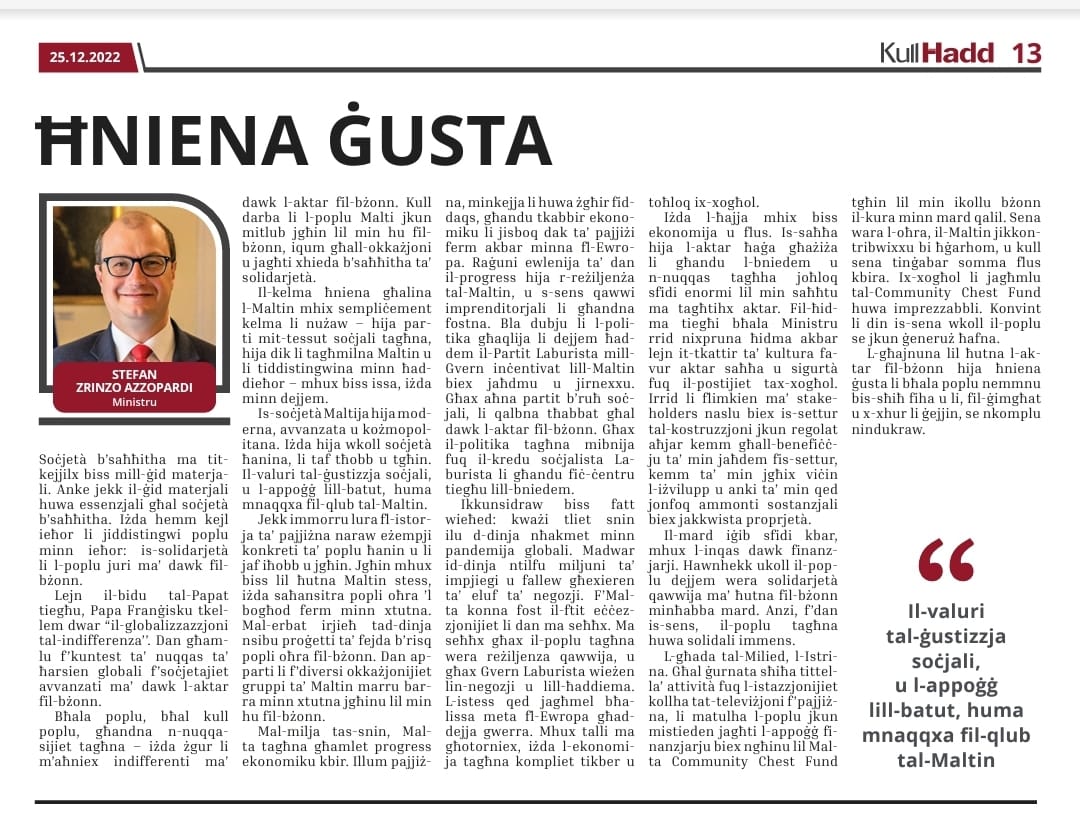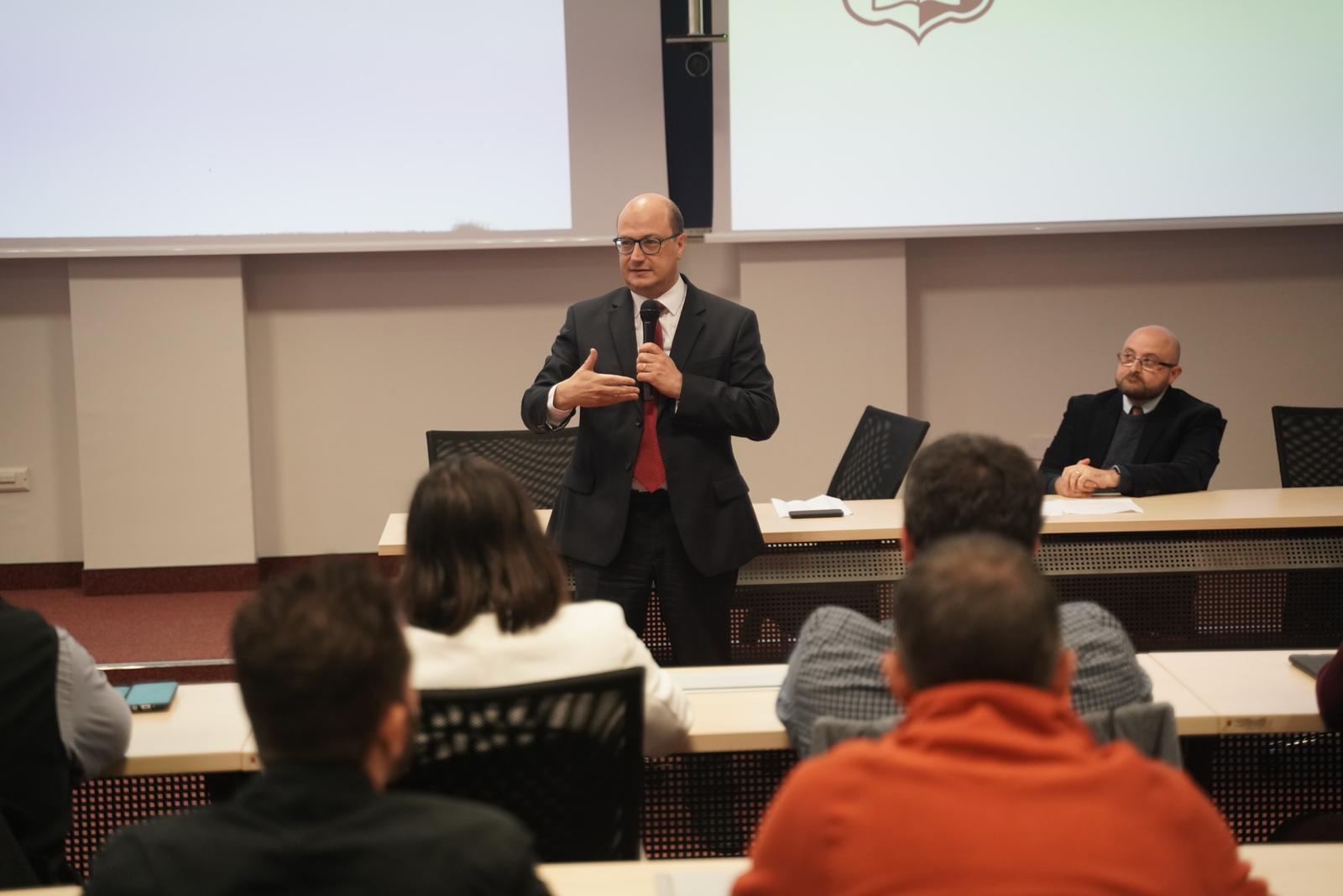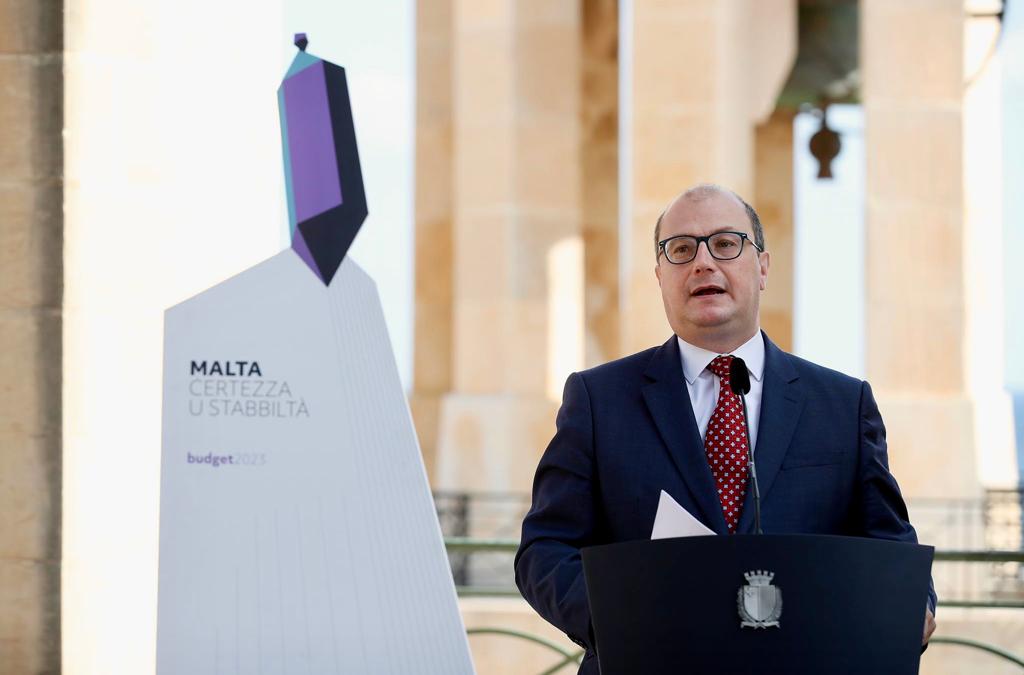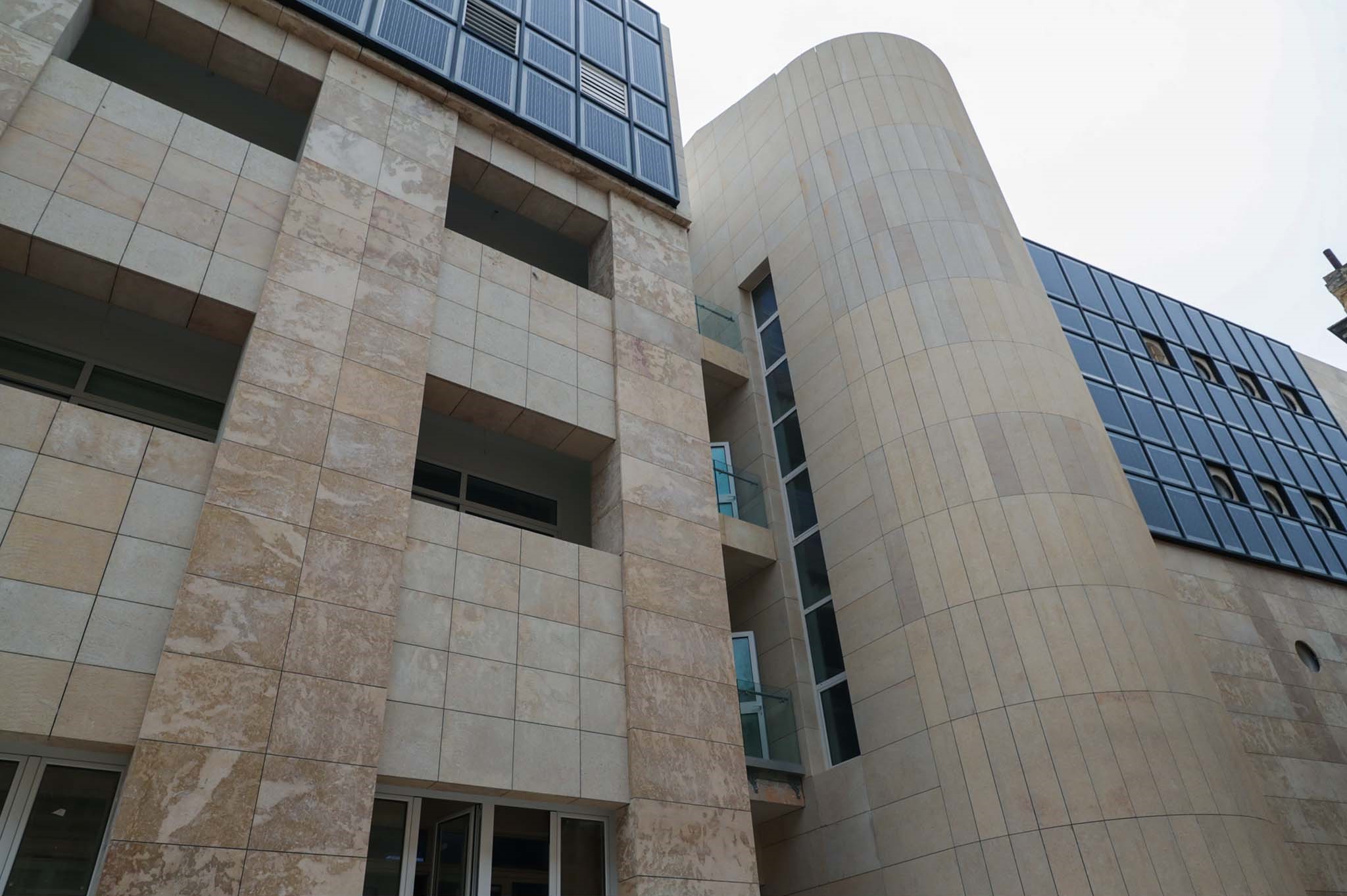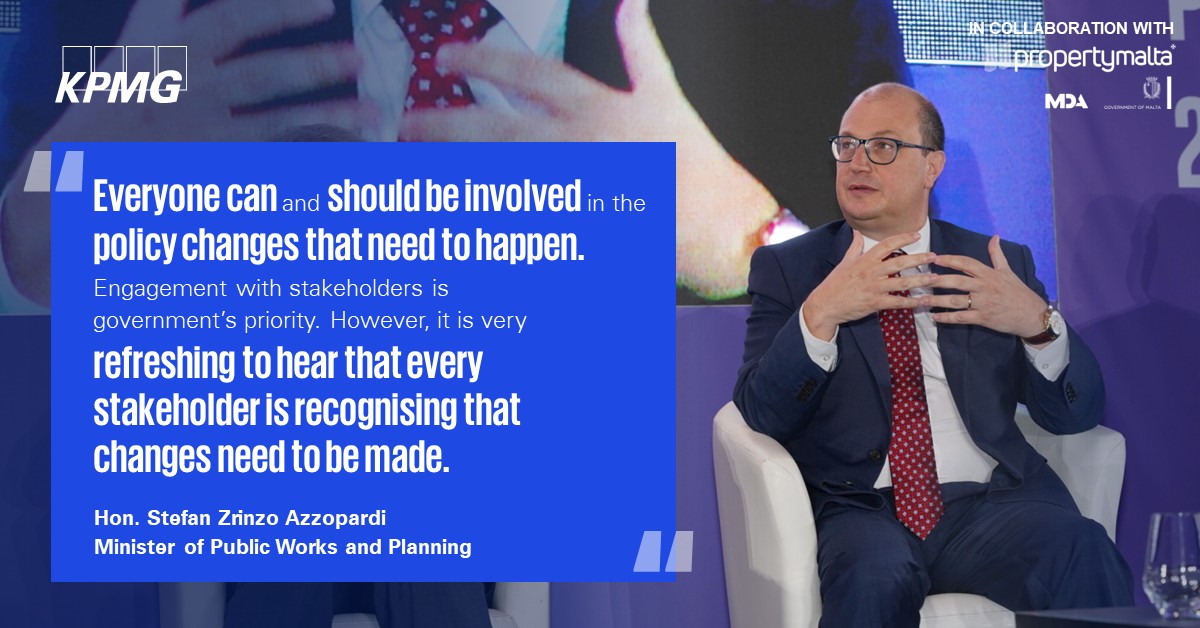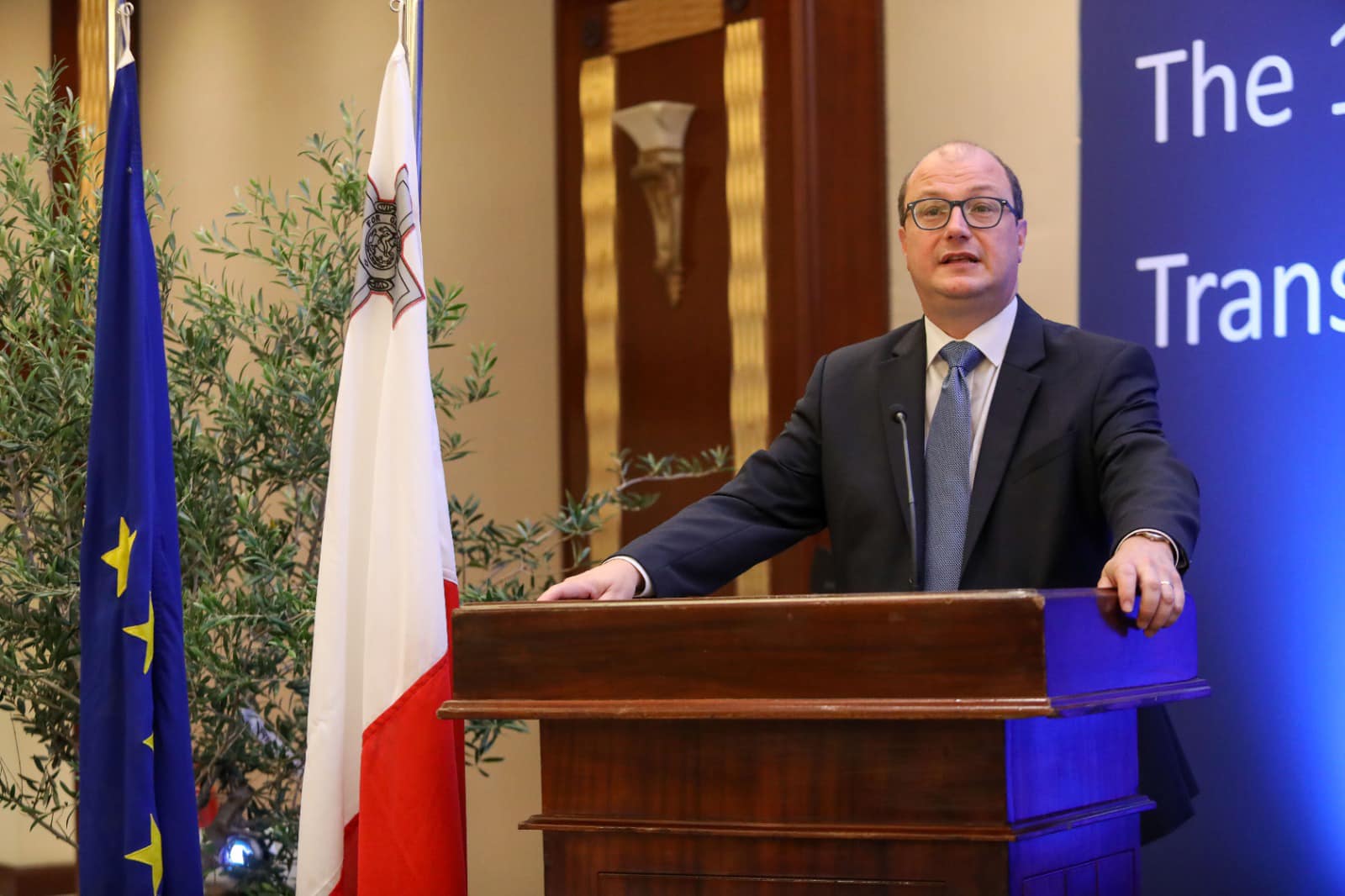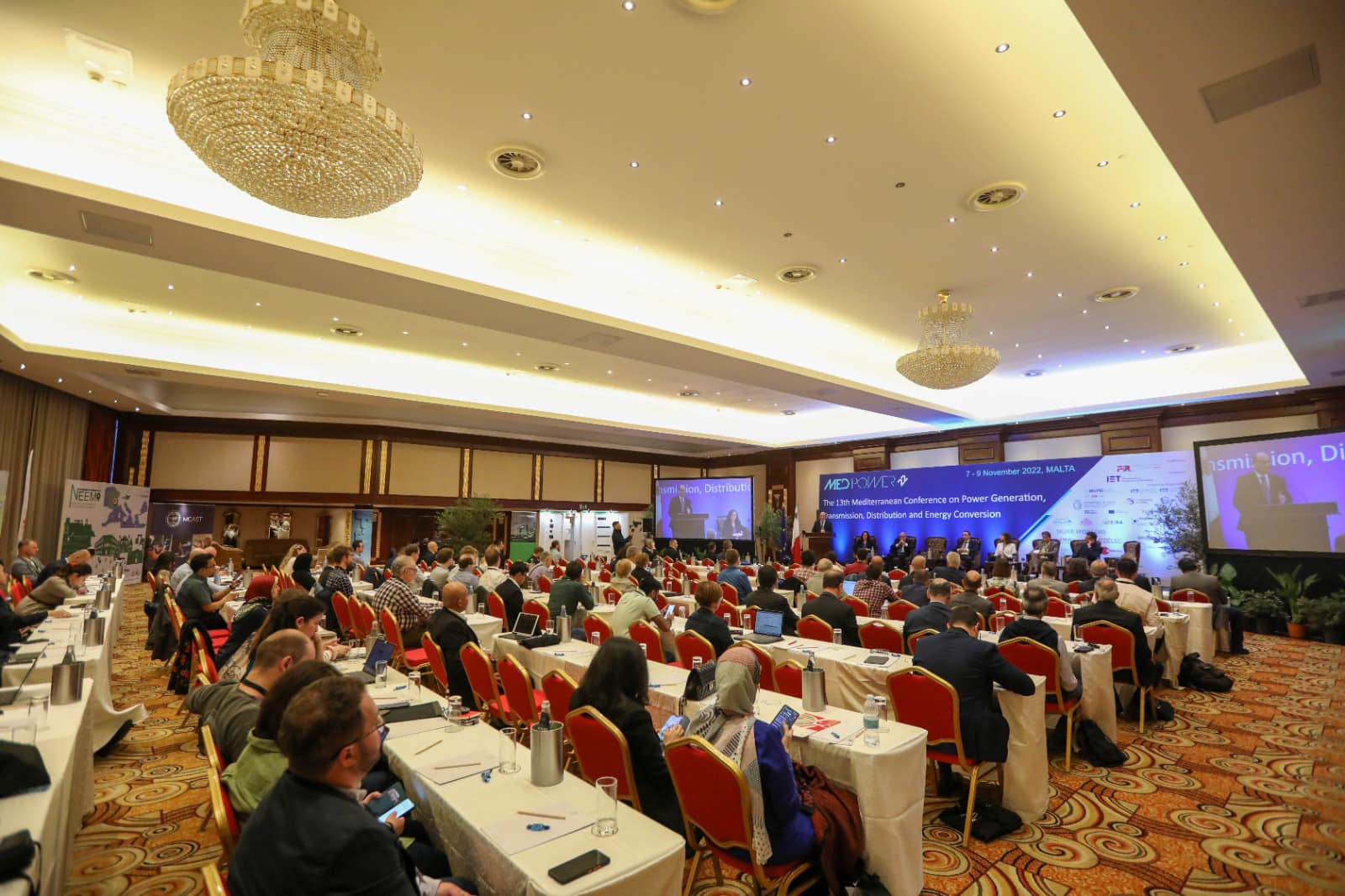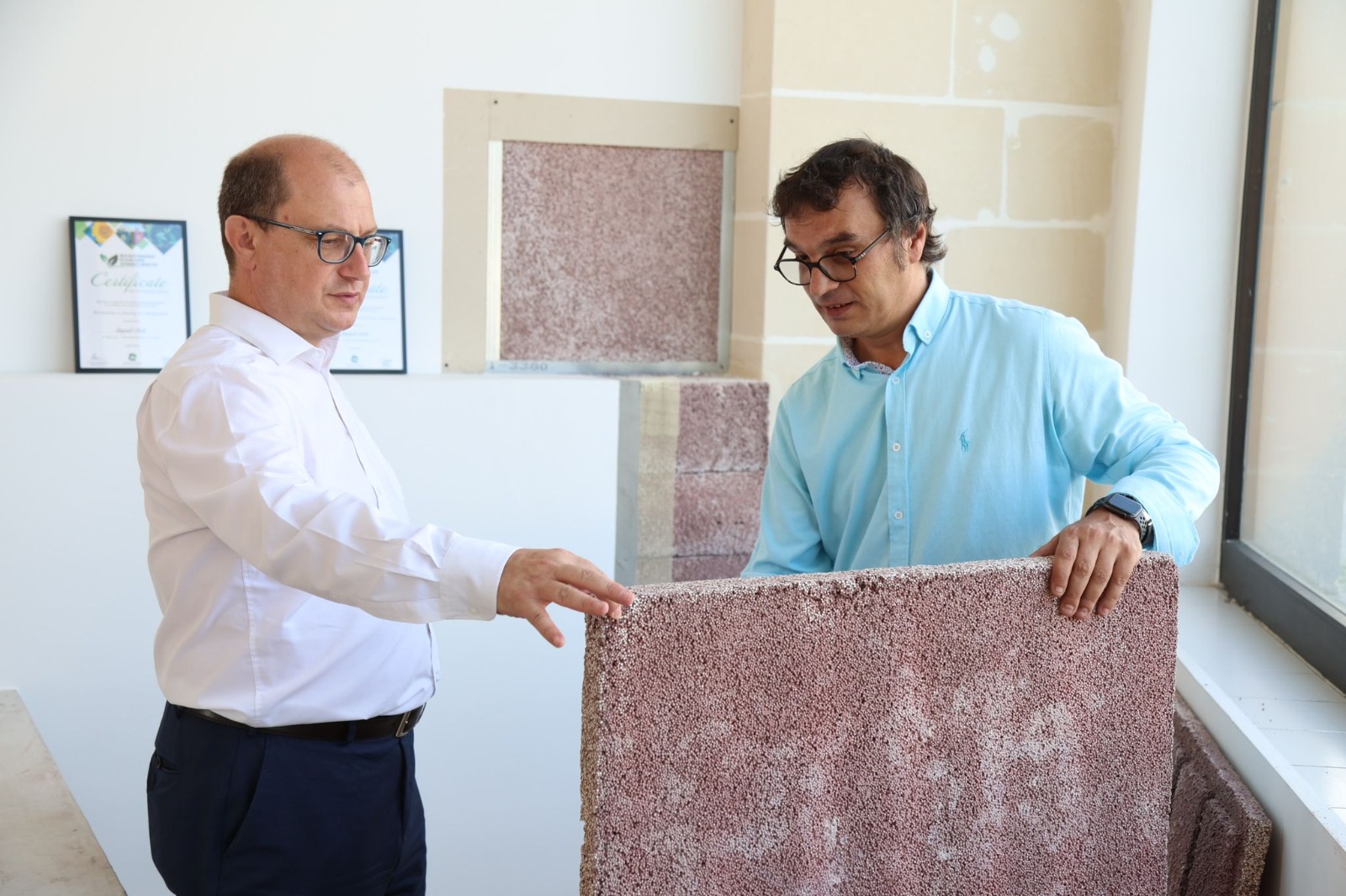Insaħħu r-regolamentazzjoni fis-settur tal-kostruzzjoni biex ikollna kwalità ogħola, jissaħħaħ l-infurzar u jkollna aktar serjetà fit-tħaddim ta’ dan is-settur. Għall-ewwel darba, se tkun qed tiġi introdotta liċenzja għall-kuntratturi tal-kostruzzjoni. Dan huwa proċess ġdid li huwa meħtieġ u li se jirregola lil min jopera f’dan is-settur lil hinn mil-liġijiet ċivili u kriminali li għandna fis-seħħ diġà.
Regolamenti li jindikaw min jista’ jkun kuntrattur. Jirregolaw min jista’ jwettaq dawn ix-xogħlijiet li lkoll nafu r-riskji u r-responsabilitajiet li jġibu magħhom. Jirregolaw aħjar il-mod kif il-kuntratturi joperaw f’dan il-qasam.
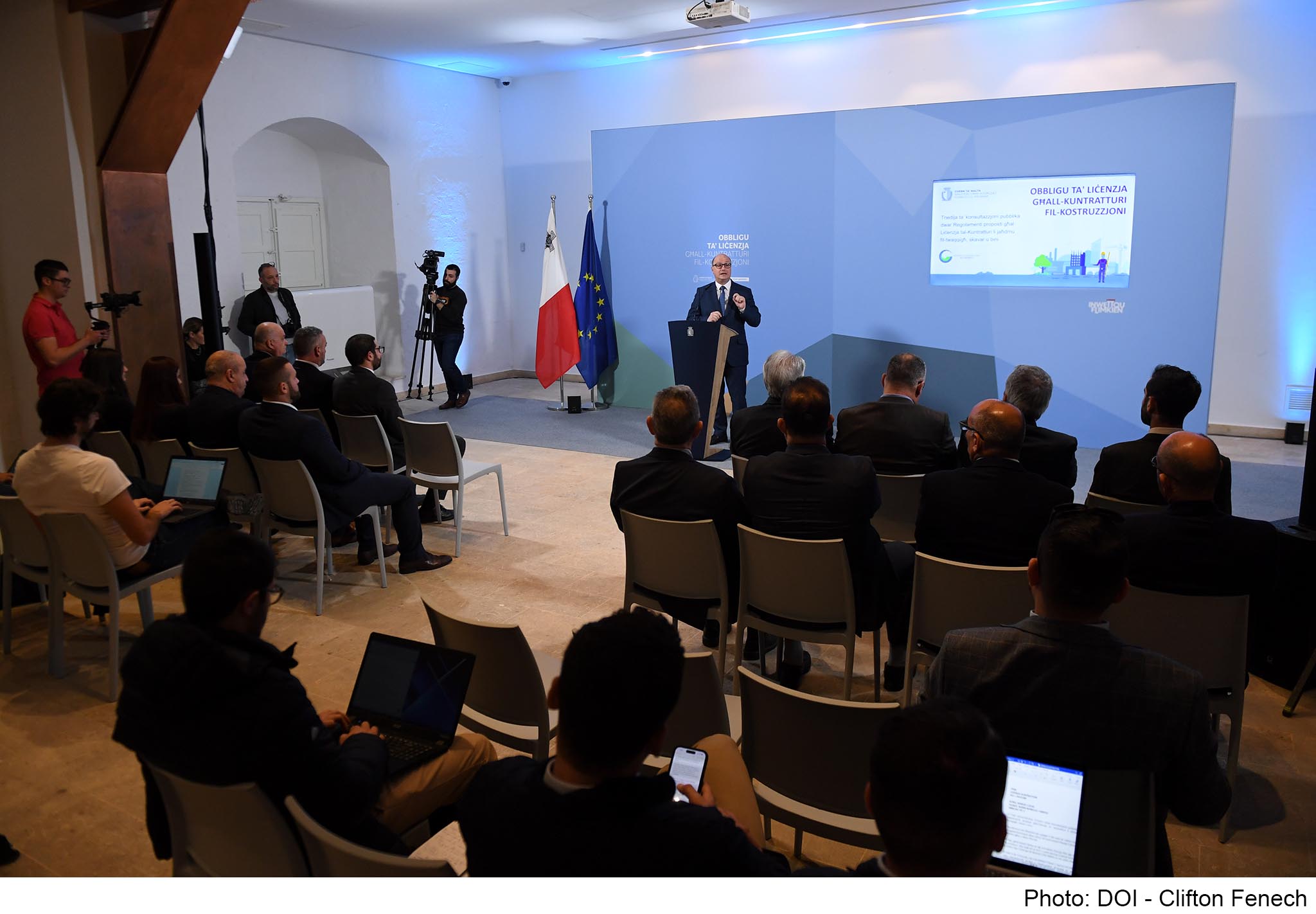
Kull min jaħdem f’dan is-settur huwa diġà suġġett għal obbligi legali mill-aspett ċivili mill-kunċett tal-appalt u r-regoli tad-danni fost oħrajn. Hemm obbligi marbuta ma’ sitwazzjonijiet li jwasslu għal prosekuzzjoni kriminali. Wieħed irid ifakkar wkoll fir-regolamenti tas-saħħa u s-sigurtà fuq il-post tax-xogħol kif wkoll regolamenti li qed jinħarġu mill-Awtorità tal-Bini u l-Kostruzzjoni.
Se nkompli nsaħħu dan il-qafas ta’ regolamentazzjoni b’dawn il-licenzji. Dan se jsir billi jkollna regolamenti li jindikaw sistema ta’ awtorizzazzjoni ta’ min jista’ jwettaq xogħol ta’ twaqqigħ, skavar jew tqattigħ u xogħol ta’ bini.
Dan il-qafas regolatorju, huwa meħtieġ u se jkun mezz importanti fis-sensiela ta’ bidliet li se nkomplu nwettqu biex insaħħu r-regolamentazzjoni fil-qasam tal-kostruzzjoni.
L-għanijiet li jiġu introdotti il-liċenzji tal-kuntratturi huma:
- Min irid jaħdem f’dawn l-oqsma irid ikun identifika ruħu mal-Awtorità dwar il-Bini u l-Kostruzzjoni u min għandu liċenzja biss ikun jista’ jwettaq dan ix-xogħol
- Jiġu stabbiliti kriterji li wieħed irid ikollu biex jikseb liċenzja
- Jiġu definiti aħjar ir-responsabbilitajiet ta’ kuntrattur
- Jissaħħu l-mezzi tal-infurzar fil-konfront ta’ kuntratturi liċenzjati
B’dawn ir-regolamenti rridu nagħmlu distinzjoni ċara bejn min hu serju u responsabbli fil-mod kif jaħdem minn min iwettaq dan ix-xogħol b’metodi inaċċettabbli, b’nuqqas ta’ responsabbiltà u ta’ kwalità skadenti.
Min mhux lest li jaħdem kif suppost mhux se jkollu aktar postu fis-settur tal-kostruzzjoni.
Pajjiżna u l-pubbliku in ġenerali qed jistenna li jkollna settur tal-kostruzzjoni li jitħaddem minn min ikun serju fil-mod kif jaħdem, li juża’ l-aqwa standards u li jkun responsabbli f’kull pass li jagħmel.
Ix-xogħol irid isir b’rispett sħiħ lejn id-drittijiet ta’ terzi persuni.
Ix-xogħol irid isir bl-inqas impatt fuq il-madwar u bl-inqas inkonvenjent possibbli.
Ix-xogħol irid isir minn min għandu l-ħiliet meħtieġa.
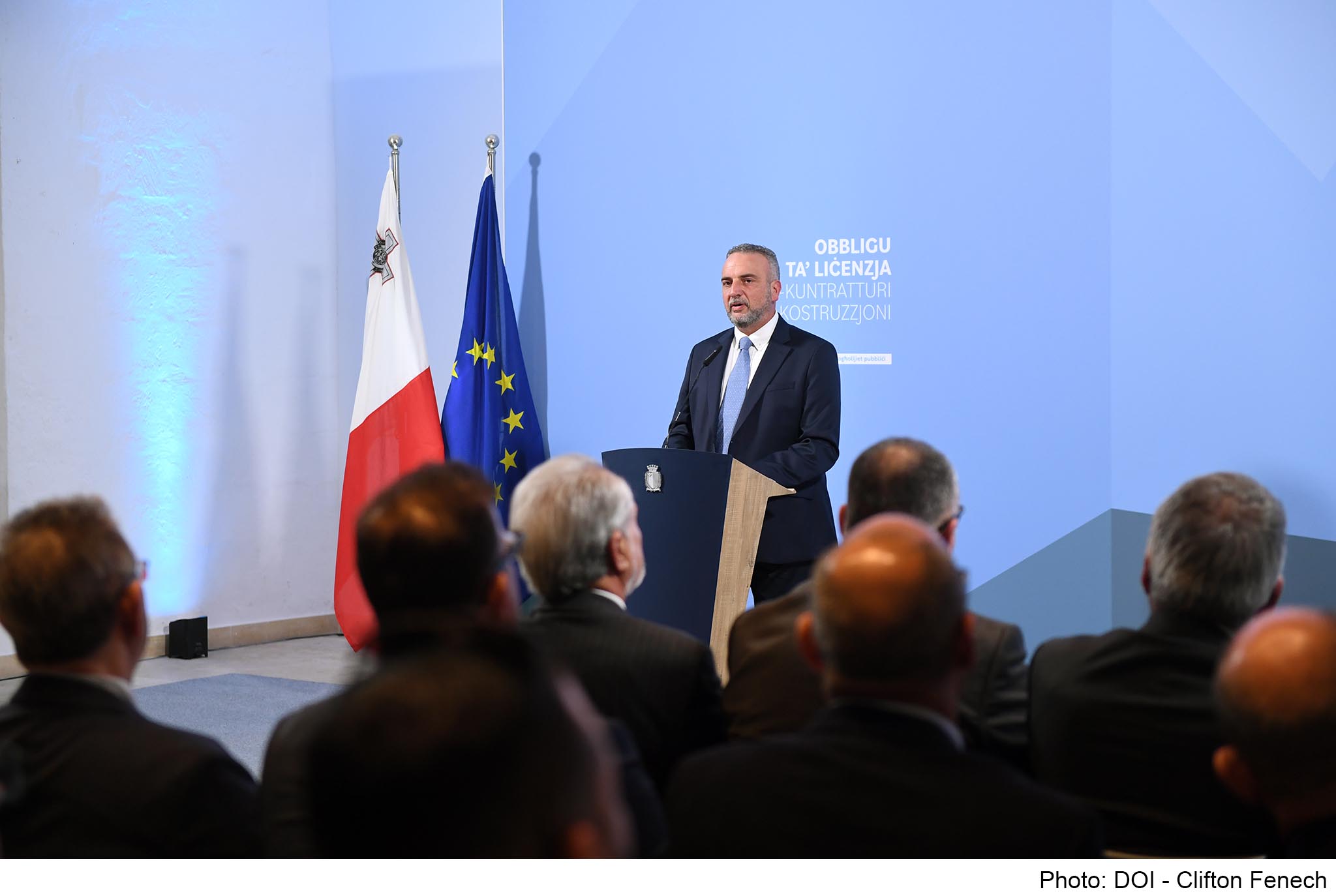
Din hija l-ewwel darba li qed inniedu qafas lejn liċenzjar sħiħ ta’ dawk kollha li jaħdmu fis-settur tal-kostruzzjoni. It-twaqqigħ, l-iskavar u l-bini huma l-ewwel tliet attivitajiet li se jkollhom il-ħtieġa tal-liċenzja għax huma it-tliet oqsma ewlenin fix-xogħol fis-settur. Irrid ngħid, li dan il-proċess ta’ liċenzjar se jkun segwit minn proċess li jitħabbar fi żmien qasir, biex jibdew jiddaħħlu skill cards għall-ħaddiema li jaħdmu f’dan is-settur b’mod obbligatorju.
Sal-lum, l-unika forma ta’ liċenzja li għandna, hija l-liċenzja ta’ bennej (mason’s license) li ġiet introdotta lejn l-aħħar tas-seklu 19.
Din il-liċenzja qed tintalab bħala rekwiżit fil-qasam tal-liċenzja ta’ kuntrattur tal-bini. Qegħdin nippjanaw li r-regolamenti marbuta ma’ din il-liċenzja jiġu aġġornati fiż-żmien qasir biex inkomplu insaħħu il-qafas regolatorju anke f dan ir-rigward.
Nedejna konsultazzjoni pubblika dwar il-qafas legali li jintroduċi liċenzja ta’ min jaħdem fil-qasam tat-twaqqigħ, skavar u bini. Din hija riforma estensiva li tbiddel il-qafas regolatorju u għalhekk timmerita li jkollha proċess ta’ konsultazzjoni iddedikat esklussivament għaliha.
Proċess ta’ konsultazzjoni li fih nisimgħu id-diversi perspettivi mhux biss ta’ dawk li joperaw f’dan is-settur li m’huwiex numru żgħir, imma rridu nisimgħu x’għandu x’jgħid il-pubbliku b’mod in ġenerali f’dan ir-rigward.
L-Avviż legali li qed inniedu ghall-konsultazzjoni pubblika għandu żewġ għanijiet prinċipali:
- Jinħatar kumitat ta’ liċenzjar tal-kuntratturi fil-qasam tal-kostruzzjoni
- Jistipula l-qafas regolatorju li permezz tiegħu tinħareġ liċenzja
Inżid ngħid li fl-aħħar jiem ġie ppubblikat abbozz tal-liġi li permezz tiegħu se nkunu qegħdin nemendaw l-Att dwar l-Awtorità dwar il-Bini u l-Kostruzzjoni biex ikun jista jinħatar kumitat speċjalizzat għall-ipproċessar tal-liċenzji kif wkoll se nkunu qed nitrasferixxu s-setgħa li għandu d-Direttur tad-Dipartiment ghax-Xogħlijiet Pubbliċi biex joħroġ liċenzja tal-bennej u din tgħaddi lil Awtorità tal-Bini u l-Kostruzzjoni.
Ir-regolamenti li qed inniedu jindikaw min jista’ jkollu liċenzja. Jindikaw kif tiġi evalwata applikazzjoni għall-ħruġ ta’ liċenzja. Tispjega wkoll is-setgħat fejn jidħol l-infurzar fil-konfront tal-kuntratturi. Il-konsultazzjoni pubblika tibda’ mil-lum u se tkompli sa nhar il-21 ta’ April 2023.
Determinati li mill-1 ta’ Ġunju 2023, l-Awtorità tal-Bini u l-Kostruzzjoni tibda tilqa’ l-applikazzjonijiet biex mill-1 ta’ Novembru 2023 jibda jitħaddem il-qafas regolatorju l-ġdid.
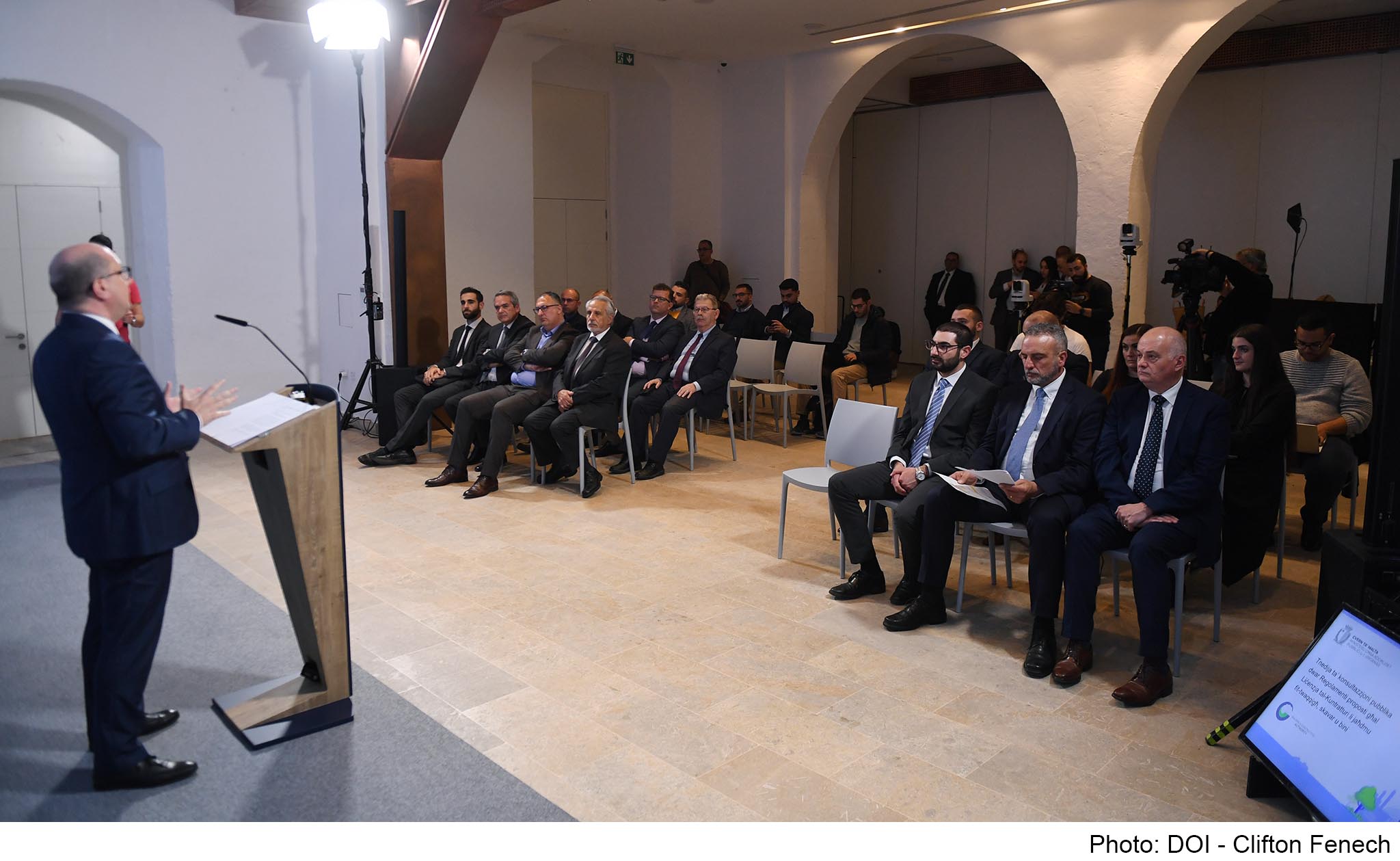
Irrid infakkar li d-dħul ta’ qafas regolatorju ġdid jeħtieġ żmien ta’ tranżizzjoni iżda f’dan iż-żmien ta’ tranżizzjoni l-Awtorità xorta se jkollha s-setgħa li twaqqaf kuntratturi li jonqsu fit-twettieq tax-xogħol tagħhom. Tidħol fis-seħħ is-setgħa tas-sospensjoni u anke tar-revoka. Infakkar ukoll li llum, l-Awtorità diġà għandha s-setgħa li toħroġ stop notice meta l-affarijiet li jkunux qed jimxu sewwa fuq sit ta’ kostruzzjoni. Bl-istop notice jieqaf ix-xogħol fuq dan is-sit partikolari qabel jiġu regolati l-affarijiet.
Is-sospensjoni tal-liċenzja jew ir-revoka tal-liċenzja tfisser li kuntrattur ma jaħdem fuq l-ebda lant tax-xogħol. Il-liċenzja se jkollha valur importanti għall-kuntrattur. Kull min se jikseb liċenzja jew jimxi sew jew hemm il-konsegwenzi fosthom li tintilef il-licenzja li jkollu kuntrattur. Biex kuntrattur jaħdem f’dan is-settur jew ikollu liċenzja jew l-operat tiegħu jieqaf.
Għall-ewwel darba se nirregolaw dan is-settur bid-dħul ta’ liċenzja għal dawn it-tlett oqsma. Din hija bidla radikali u bidla li se tħalli impatt pożittiv. Bidla fid-direzzjoni t-tajba.
Dan huwa pass importanti ferm lejn kwalità ogħola fis-settur tal-kostruzzjoni. Mezz ieħor biex ikompli jissaħħaħ l-infurzar f’dan is-settur.
Pajjiżna u l-poplu irid aktar serjetà kif jitħaddem dan is-settur.
L-abbozz tal-Avviż Legali issa jinsab għall-Konsultazzjoni Pubblika li tagħlaq fil-21 ta’ April li ġej u jista’ jinkiseb mis-sit elettroniku tal-konsultazzjoni https://www.gov.mt/mt/publicconsultation/Pages/default.aspx
jew mis-sit tal-Awtorità tal-Bini u l-Kostruzzjoni: https://bca.org.mt/licensing-of-contractors/
Opinjonijiet dwar l-abbozz ta’ regolamenti jistgħu jintbagħtu wkoll b’email fuq [email protected]


